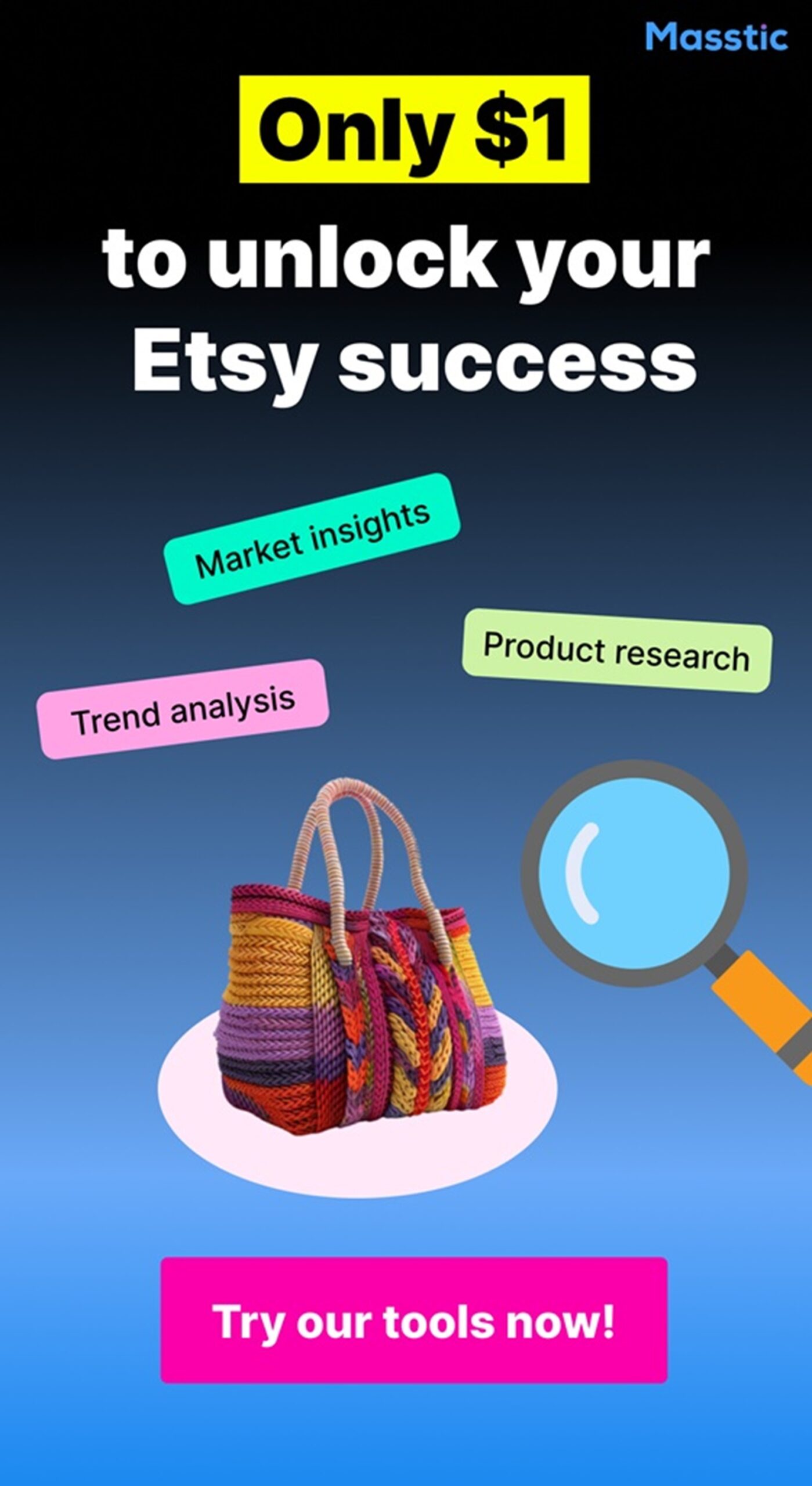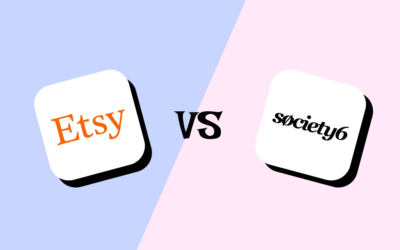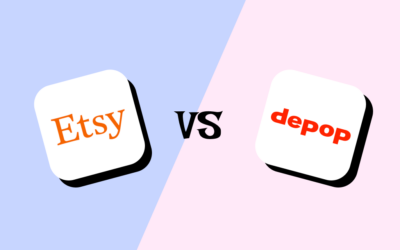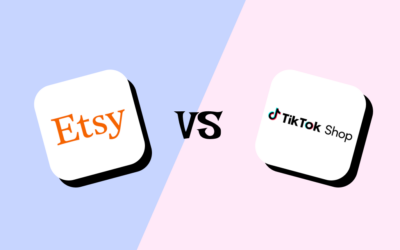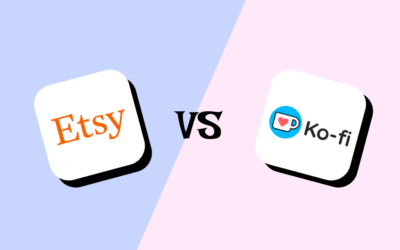14 Etsy Alternatives to Sell Your Crafts Online in 2024
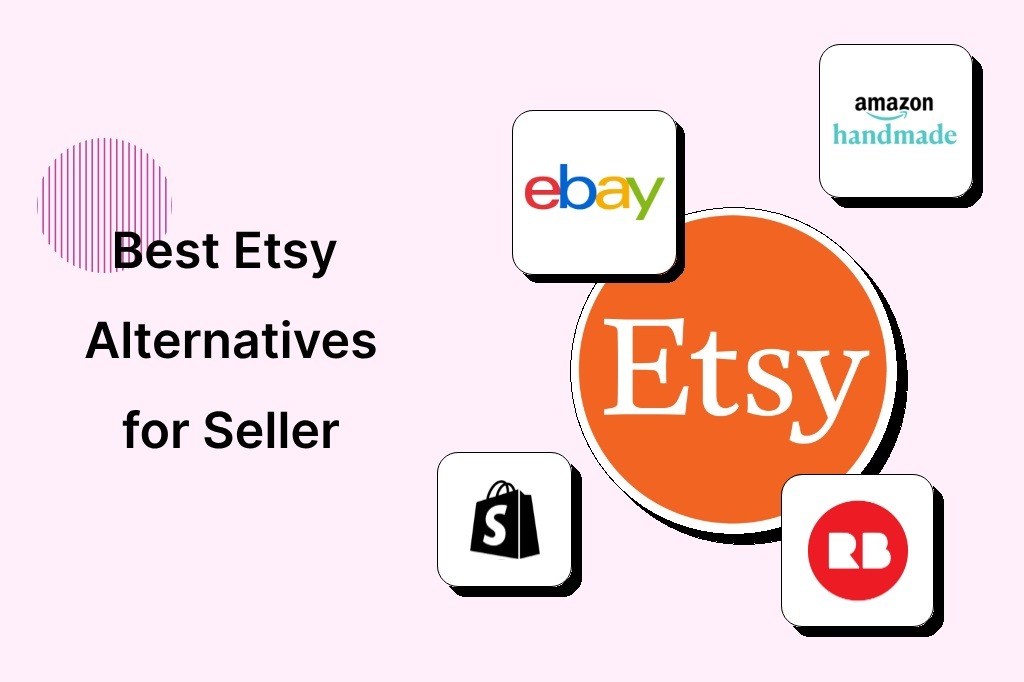
With its vast global audience, Etsy is a no-brainer marketplace where you can sell your crafts and handmade items online. However, apart from Etsy, it wouldn’t hurt to explore Etsy alternatives to broaden your choices and make a more informed decision.
To give you a bird-eye view of popular options, our shortlist would contain all kinds of eCommerce platform types. It could be another marketplace like Amazon Handmade, an eCommerce website builder like Shopify, or a social commerce channel like TikTok Shop.
Without further ado, let’s dive into 14 alternatives to Etsy!
14 Etsy Alternatives Best Kept Secret
| Etsy alternatives | Pricing and fee | Pros | Cons |
| Amazon Handmade | – Subscription: $0.99/item sold or $39/month – Listing: $0.005 per exceeding listing – Referral: 15% FBA: $2.41 – $5.26 | + Vast audience + Affordable listing fee + Integration with Amazon’s ecosystem | – Pricey fees – Not suitable for digital items |
| Shopify | – Subscription: $25 – $399 per month – Payment processing: 2.5% + 30¢ – 2.9% + 30¢ – Third-party payment: 0,6% – 2% | + Customizable + Great built-in eCommerce tools + Affordable subscription plans | – Extra 3rd-party payment gateway transaction fee – Take time to set up – More effort to promote |
| eBay | – Subscription: $7.95 – $349.95 per month – Final value fee: 0.5% to 15% of the total amount + 30¢ | + International customer base + Option for auction-style listings + eBay seller protection program | – Higher fees than Etsy – More competitive – Less focus on handmade items |
| Redbubble | – The base cost is set by Redbubble. – You earn profit by deciding your markups. | + No subscription or listing fees + Easily set your profit margins + Around 40 million monthly visits | – Only 30 daily design uploads – Potential account suspension – Limited integration support |
| Poshmark | – Products below $15: $2.95/item – Products from $15 or more: 20% sale price | + Simpler pricing + On-the-go mobile app + Social media marketing features | – Higher fees than Etsy – Focus solely on apparel – Only available in the US and Canada |
| Big Cartel | – Free plan available – Two paid plans from $15 – $30 per month – Varied payment processing fees. | + More customizable storefront + No listing fees or transaction fees + Full control over branding | – Only 500 products, even on the highest plan – Must drive your own traffic |
| Squarespace | – Subscription: $36 – $72 per month – Extra transaction fee: 3% if using the $36-per-month plan | + Unique templates + Robust marketing features + No limit on product listings | – Costs can be a bit high – Fewer sales apps than purposely-built eCommerce platforms |
| TikTok Shop | – Marketplace Commission Fee: 2.5% – 4% – Transaction fee: 2.16% | + Huge audience reach + Various ways to sell your products + Very engaging users | – Only available in some countries – The fees can get high for large stores |
| Go Imagine | – Transaction fee: 5% per sales – Payment processing fee: 2.9% + 30 cents | + Prettier store layout + Can attract conscious customers + Diverse & quality product ranges | – Only available in the US – Fewer shoppers – The approval process can be tough |
| Wix | – 1 free plan – From $29 – $159 to list and sell products | + Free plan available + Easy to use + Over 600 templates | – Limited storage and features for lower plans – Less flexible than some other platforms |
| Ecwid | – Free plan available – Paid plans from $25 – $105 per month | + Free plan available + Can be added to existing websites + Multichannel capabilities | – Limited standalone website – Product variations unavailable on lower plans – Not so great as a full website builder |
| IndieMade | 4 plans, from $4.95 – $19.95 per month | + It’s an economical choice + Etsy integration + Digital selling supported | – The lowest plan only supports 5 products – May lack some advanced features |
| Artisans Cooperative | Pricing information is available per contact | + You have a voice in shaping the marketplace + Best-suited small handmade sellers + No listing fees | – Smaller customer base compared to established marketplaces – A one-time buy-in fee is required – Not upfront about costs and fees |
| Bonanza | – No listing fees – Commission fees: 3.5% for items over $500 and 5% for those under $500 | + Lower commission fees compared to some competitors + User-friendly platform for sellers to set up online “booths” quickly + Easy import products from Amazon, eBay, Etsy, and Shopify | – May require additional paid tools for advanced features like inventory management – Less visibility and traffic compared to larger marketplaces like eBay |
1. Amazon Handmade
📌Best for: Artists or handmade sellers looking for an Etsy-like marketplace or those already selling on Amazon.
Launched in 2015, Amazon Handmade is a dedicated section within Amazon’s marketplace designed for merchants selling custom items. Like Etsy, Amazon has a massive global audience of over 3 billion monthly visits.
Thanks to Amazon Handmade’s deep integration with Amazon’s robust infrastructure (e.g. Prime shipping, FBA, etc.), Amazon Handmade is one of the best Etsy competitors in this list.
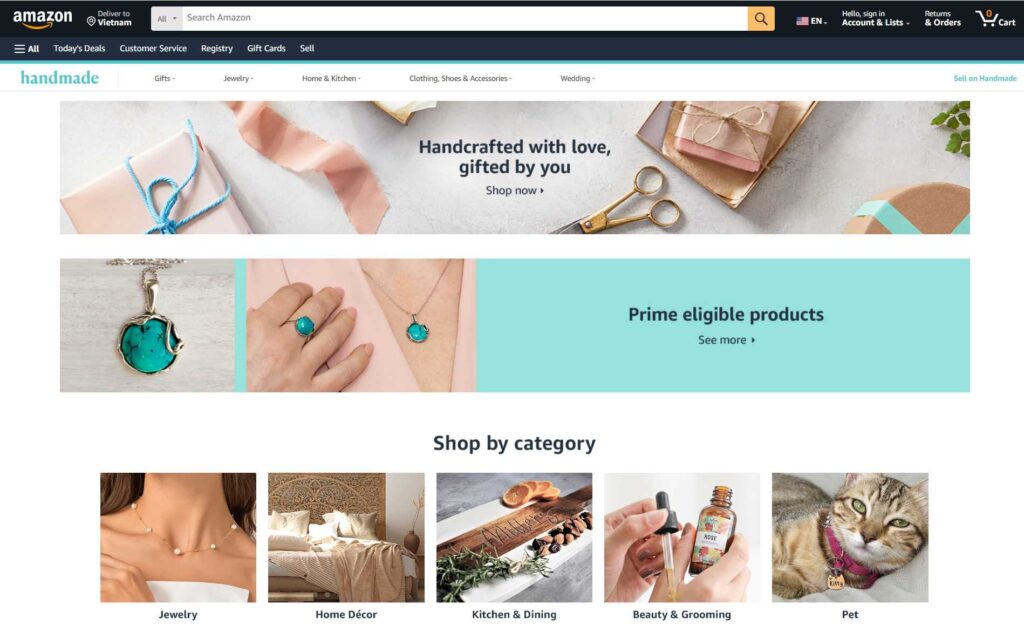
📌Pricing:
- Subscription plan: you can choose either the Individual plan at $0.99 per item sold or $39 per month for the Professional plan
- Listing fees: It’s free for the first 100,000 items, and expect to pay $0.005 per exceeding listing
- Referral fees: For each successful transaction, Amazon Handmade chargers you a 15% per sale (minimum: $1)
- FBA fees (optional): If you choose to use Amazon fulfilment servies, then the marketplace will charge you the so-called FBA fees from $2.41 to $5.26 (depending on size, weight, category, etc.)
| Pros | Cons |
| + Extensive, global customer base + Integration with Amazon Prime and fulfillment services (FBA) + No listing fees for the first 100,000 products | – The costs and fees for selling on Amazon Handmade can get much higher than Etsy – Not suitable for sellers who want to sell digital handmade products |
2. Shopify
📌 Best for: Sellers who want more control over how your website looks and works. Ideally, those with medium-to-strong branding already.
As a leading eCommerce platform trusted by over 5.2 million online stores worldwide, Shopify is one of the best Etsy alternatives worth considering. Shopify is famous for its ease of use and robust suite of built-in sales and marketing tools like email marketing, inventory management, multi-channel functionalities, etc.

📌Pricing:
- Subscription plan: 3 main pricing plans, ranging from $25 – $399/month
- Payment processing fees: 2.5% + 30¢ to 2.9% + 30¢ (higher plans have lower fees)
- Third-party payment fees*: 0,6% to 2% (higher plans have lower fees)
*Unless you use Shopify Payments (Shopify’s own payment gateway) or live where Shopify Payments is supported, you will be charged this additional fee.
Shopify recently reintroduced the Shopify $1 for 3 months deal. You can use Shopify trial for 3 days, then pay $1 each month in the next 3 months to keep your store running. This is a great opportunity to open your first online store!
| Pros | Cons |
| + More customizable over how your store looks and works + Many native sales and marketing features + Affordable subscription plans | – Additional fee for not using Shopify Payments – More time to set up a store – You need extra effort to get your store seen |
3. eBay
📌 Best for: eBay is the best choice for those who want to sell their handmade products in auction-style listings.
Up next, we have eBay– a platform on par with Amazon Handmade and Etsy, making it one of the top-tier alternatives to Etsy for artists. As a popular global marketplace, eBay is well-known for its flexibility in selling all kinds of handmade products in either the conventional or auction-style way.
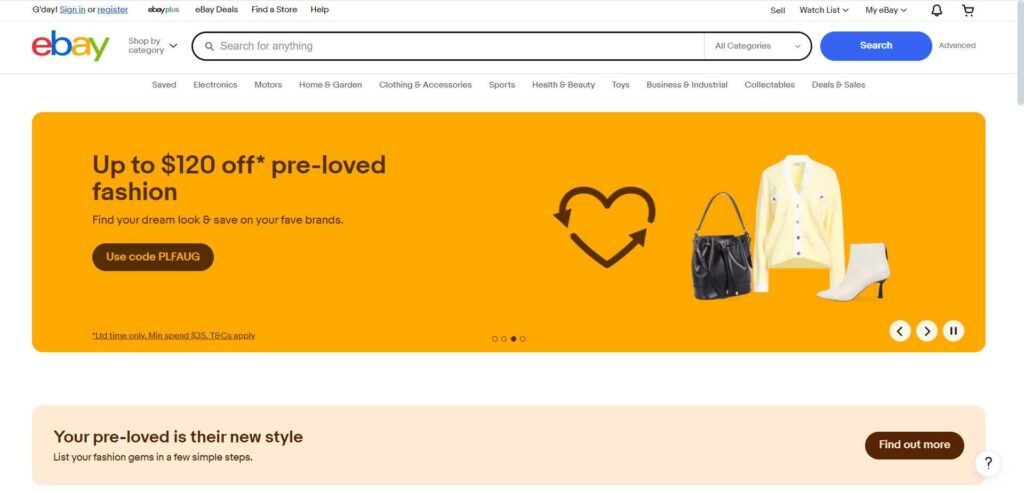
📌 Pricing:
- Subscription fee: $7.95/month (250 free listings) to $349.95/month (1,000 free auction-style listings and 25,000 free fixed-price listings)
- Final value fee when items get sold: Around 0.5% to 15% of the total amount + 30¢
| Pros | Cons |
| + Huge international customer base + Option for auction-style listings alongside fixed-price items + You get protected by eBay against abusive buyers You can sell almost any type of product | – Higher overall fees compared to Etsy (8-11% vs. 6.5%) – More competition due to the diverse range of products – Less focus on handmade or unique items |
4. Redbubble
📌Best for: Artists and designers seeking a print-on-demand platform to sell their digital designs on various products.
If you’ve been searching for the best Etsy alternatives for print-on-demand, we bet you’d find the answer with Redbubble. Redbubble is a global marketplace where independent artists and designers can sell their original arts on 70+ print-on-demand items (clothes, wall arts, etc.).
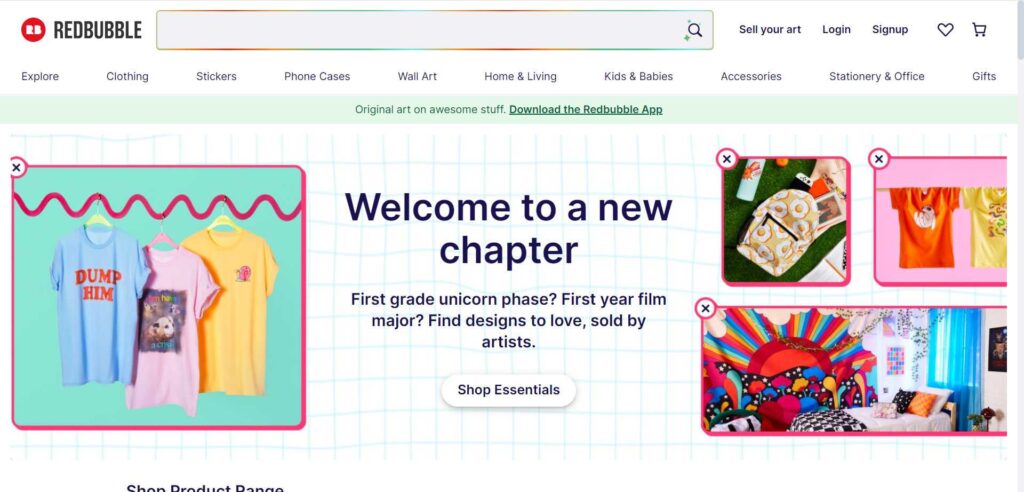
📌 Pricing:
As of writing this article, Redbubble doesn’t charge sellers any subscription fee or listing fees. Instead, each product has a base price– which is fixed by the platform and you set your markup price (your profit margin) on top of the base price.
The costs of order handling, fullfilment and shipping is taken cared by Redbubble. Hence, this makes the platform a great marketplace for low-budget artists.
| Pros | Cons |
| + No subscription fee or listing fees + You can easily set your own profit margins for each item + The platform has around 40 million visits per month | – You can only upload 30 designs per day – Some sellers have reported that Redbubble suspended their account for no reasons – No support for integration with your website or syncing products to somewhere else |
5. Poshmark
📌 Best for: Sellers in the US and Canada who wish to sell fashionable items, especially clothing and accessory items. It’s also a great marketplace to sell second-hand products.
Poshmark is a social commerce marketplace that perfectly combines social and eCommerce elements. It’s largely famous for its engaging community and a strong focus on fashion (men, women, kids). As one of the top Etsy alternatives, Poshmark enables you to list your products and interact with buyers easily.
What we particularly like about this platform is its virtual-selling event feature called “Posh parties”, which allows you to sell products to your customers while livestreaming.
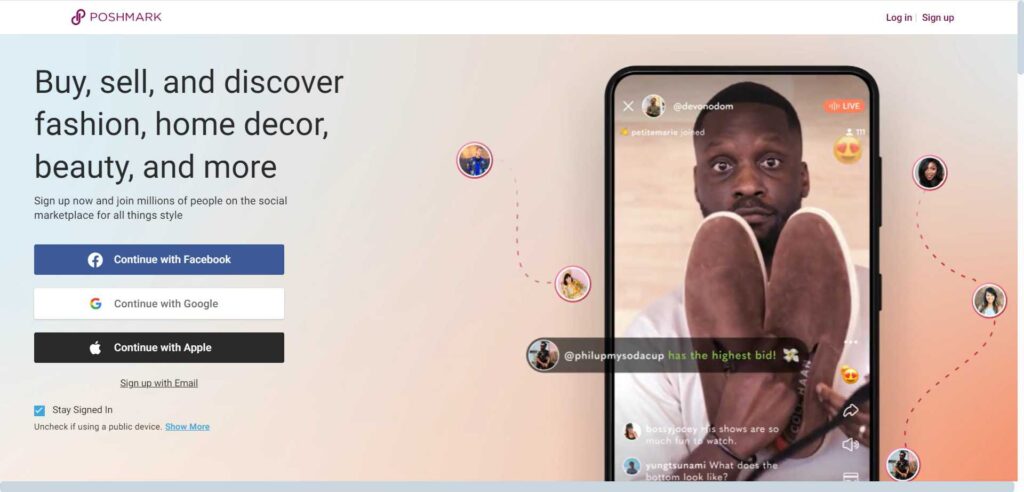
📌Pricing:
- For products priced under $15, you’ll be charged a transaction fee of $2.95/item
- For products priced $15 and above, you’ll be charged 20% of your sale price
| Pros | Cons |
| + Simpler pricing compared to Etsy’s + Poshmark comes with a mobile app so you can manage your business on the go + Built-in social media marketing features (Posh parties, social sharing) | – The pricing is simple but higher than Etsy – Focus solely on apparel – Only available in the US and Canada |
6. Big Cartel
📌 Best for: Artists, designers, and small-scale freelance teams who want to sell unique, handmade items through their own customizable website.
Big Cartel is a fully-hosted eCommerce platform specifically designed for small-scale creatives. Though it works similarly to Shopify, Big Cartel’s features are more simplified for newbies and individual artists.
Notably, Big Cartel supports the sale of digital products through integration with Pulley, making it also among the great Etsy competitors for digital products.
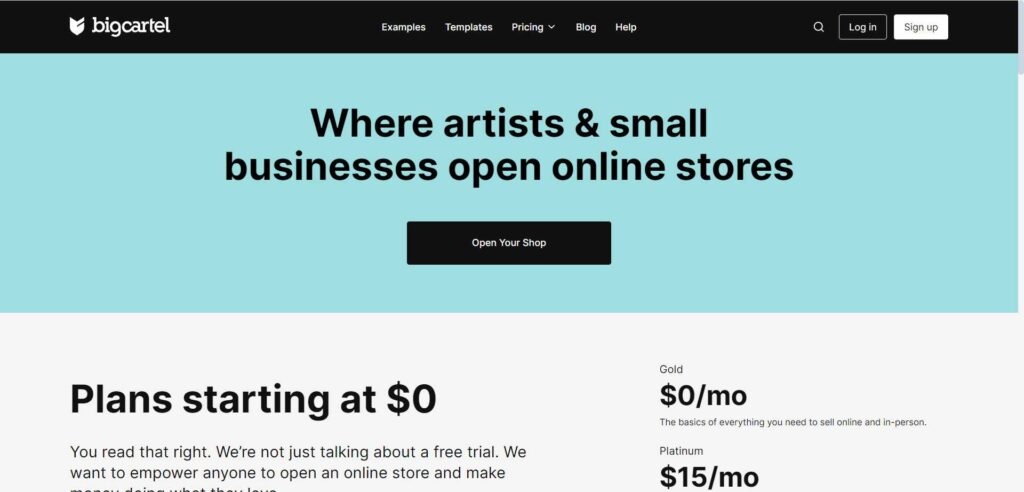
📌 Pricing:
- Big Cartel offers one free plan with 5 products. It has two plans– Platinum ($15/month), supporting 50 products & Diamond ($30/month), supporting 500 products.
- Payment processors like PayPal or Stripe will charge their standard fees.
| Pros | Cons |
| + More customizable storefront compared to Etsy’s standardized shop design + No listing fees or transaction fees, potentially lower costs for high-volume sellers + Full control over branding and customer experience | – Limited to 500 product listings even on the highest plan, while Etsy is unlimited – No built-in marketplace, so sellers must drive their own traffic |
7. Squarespace
📌 Best for: Sellers or artists who are looking for unique and stunning website templates.
Up next, we have Squarespace, one of the top Etsy alternatives you should consider. As a prominent website builder, Squarespace is well-reputed for its visually stunning and unique templates, which we find quite suitable for creative artists.
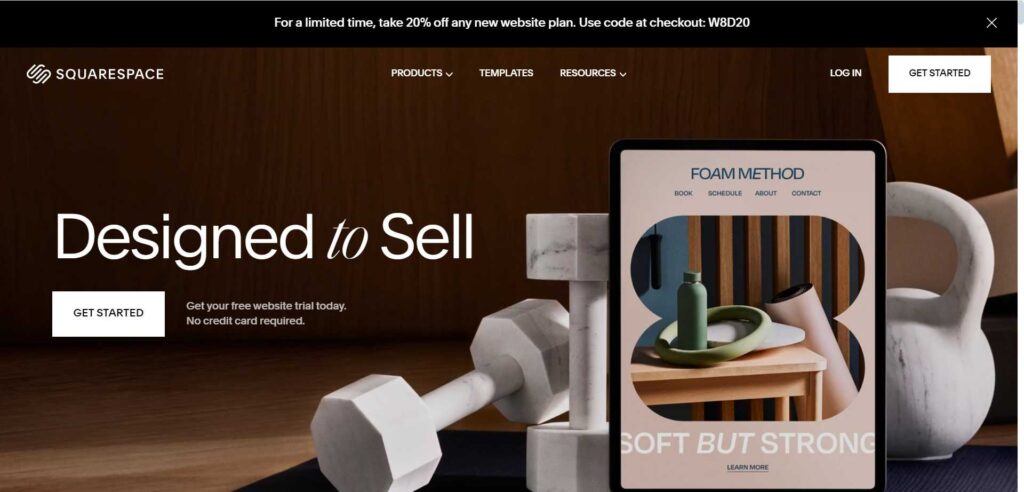
📌 Pricing:
Squarespace’s lowest pricing plan costs $25/month. However, to sell your crafts online, you’ll need to be on one of its online store plans, which costs $36 – $72/month. But be well-noted that the $36-plan comes with a 3% transaction fee.
| Pros | Cons |
| + Absolutely beautiful and unique website templates + Robust marketing tools like email campaigns and SEO features + No limit on the number of products you can add and sell | – Higher costs compared to some alternatives like Big Cartel – Fewer sales app integrations compared to some eCommerce-specific platforms |
8. TikTok Shop
📌 Best for: Passionate content creators on TikTok who are eligible for TikTok Shop.
Besides the traditional eCommerce website and marketplace, social commerce has been all the rage in the recent years. And among various social commerce channels like Instagram Shopping, Facebook Shops, TikTok Shop is the most prominent name.
With the hashtag #TikTokMadeMeBuyIt getting 4.6+ billion views, TikTok Shop is an awesome Etsy alternative for those who want to leverage the platform’s existing audience.
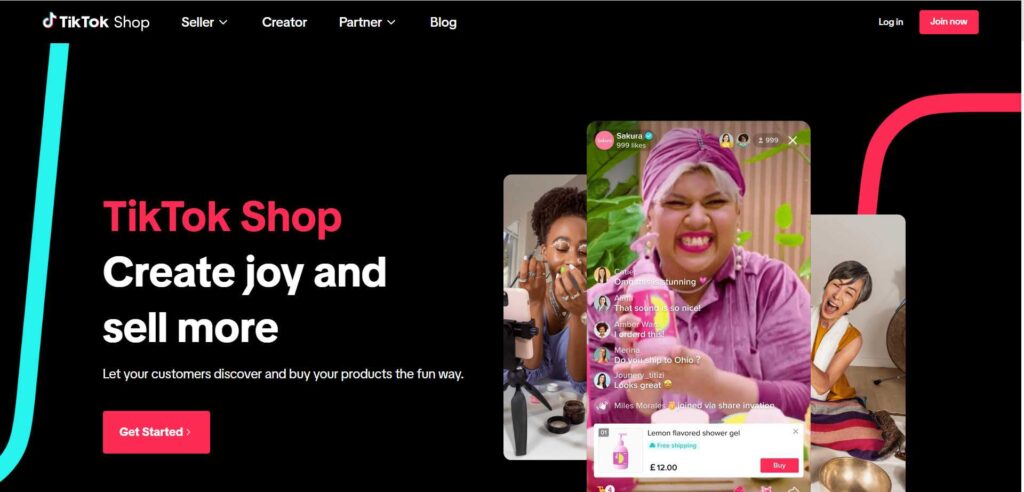
📌 Pricing:
- Marketplace Commission Fee: largely from 2.5% to 4%, depending on your product category
- Transaction fee: 2.16% per successful transaction
| Pros | Cons |
| + Huge audience reach + Various ways to sell: in-feed videos, live shopping, influencer deals, etc. + TikTok users are super engaging | – Only available in Indonesia, Malaysia, Philippines, Singapore, Thailand, the UK, the US, and Vietnam – The fees of selling on TikTok Shop can get high for large-volume stores |
9. Goimagine
📌 Best for: Those who want to sell handmade products on a marketplace that emphasizes quality, authenticity, and social responsibility.
Goimagine is a selective marketplace launched in 2020 that focuses on handmade products created by US-based artisans. What makes it special is that Go Imagine commits to donate all its profits to charities that help children in need.
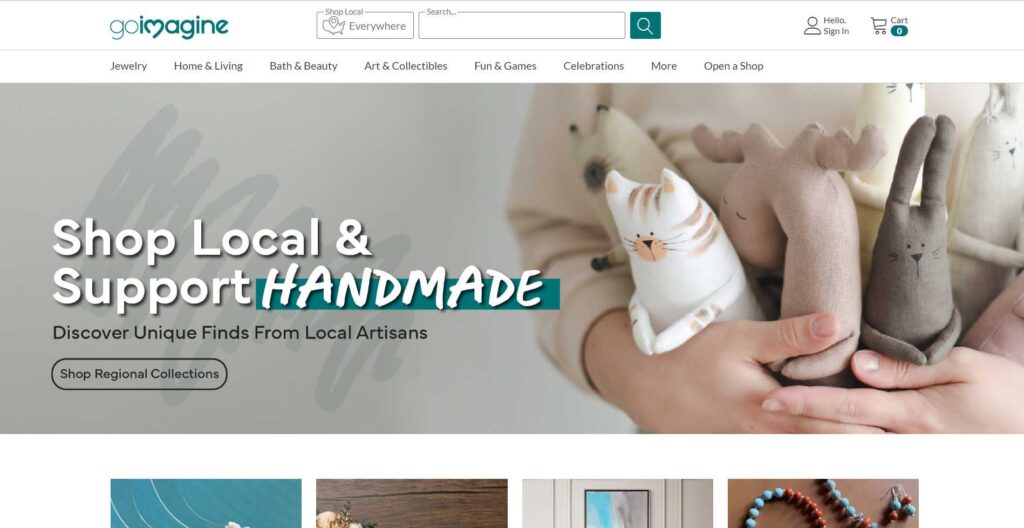
📌 Pricing:
- Goimagine’s transaction fee: 5% per sales
- Payment processing fee: 2.9% + 30 cents
| Pros | Cons |
| + We personally think the store layout looks better than Etsy + The platform’s charity focus can attract conscious customers + Goimagine encourages diverse & quality product ranges | – Only available in the US – Fewer shoppers compared to big marketplaces like Etsy – The approval process can be tough if your products aren’t up to the platform’s standards |
10. Wix
📌 Best for: Small businesses, artists, or individuals looking to create good-looking websites with simplified eCommerce capabilities
As a globally famous website builder loved for its ease of use and customizable templates, we do think Wix deserves a spot here. What we like about Wix is that it’s quite affordable and still gives you an adequate number of eCommerce functionalities to list, sell, and manage your store.
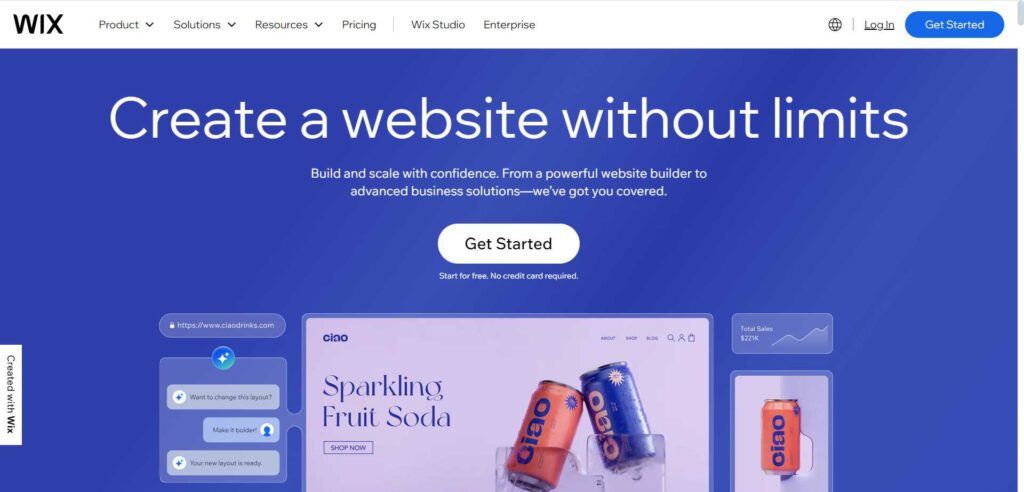
📌 Pricing:
- One free forever plan so you can test out the water
- The platform has 4 paid plans, starting from $17 to $159 per month. However, the platform only supports eCommerce features for plans from $29/month (Core).
| Pros | Cons |
| + Free plan available to see whether Wix fits you or not + Wix is one of the easiest-to-use website builders + Over 600 beautiful and customizable templates | – Lower-tier plans have limited storage and functionalities – Some users may find it less flexible than open-source platforms |
11. Ecwid
📌 Best for: Low-budget sellers who want to add eCommerce features to their existing websites and sell across multiple channels.
This list would be incomplete without Ecwid, one of the best Etsy alternatives, thanks to its affordability and ease of use. As they said, Ecwid stands for “eCommerce widget”. This means you can list your crafts and start selling everywhere– be it a WordPress website, social commerce platform, or even sync them to marketplaces like Etsy.
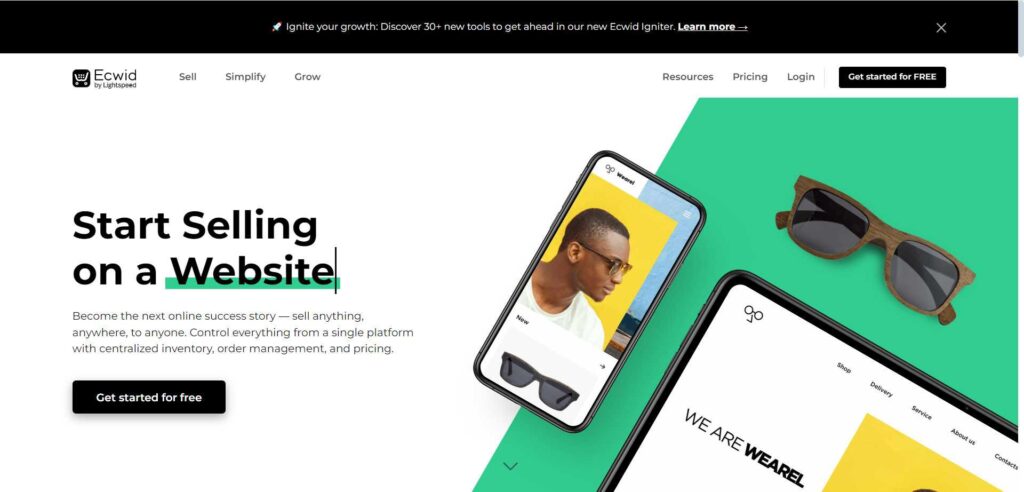
📌 Pricing:
- Free plan available (limited to 10 products)
- Paid plans range from $25 to $105 per month
| Pros | Cons |
| + Free plan available + Can be added to existing websites + Multichannel selling capabilities | – Limited standalone website option (only one page) – Product variations not available on Free or Venture plans – Best suited as a widget rather than a full website builder |
12. IndieMade
📌 Best for: Small businesses looking for an easy-to-use eCommerce platform, especially those who also sell on Etsy.
IndieMade is a specialized e-commerce platform tailored for artisans, crafters, and small businesses selling unique or handmade products. What sets IndieMade apart is its seamless integration with Etsy, allowing you to sync your Etsy catalog with the IndieMade store and keep your inventory automatically updated in real time.
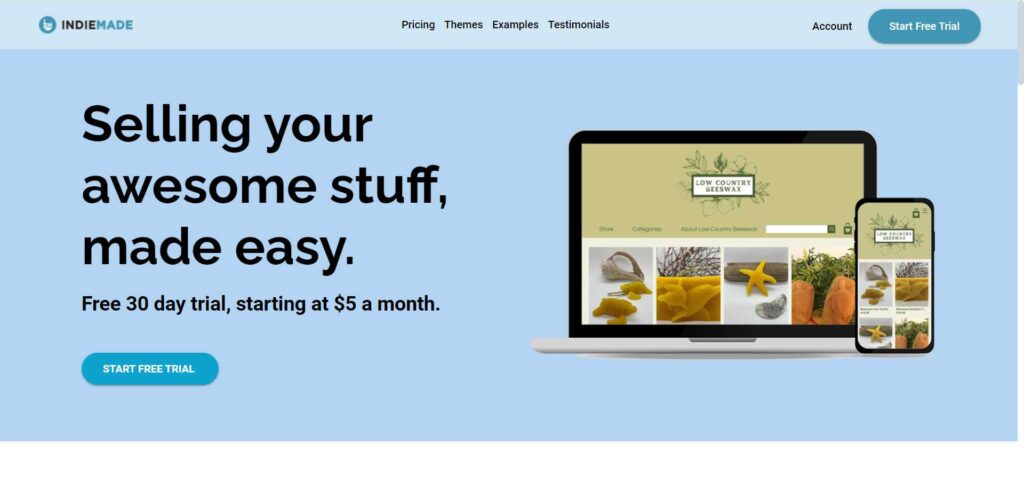
📌 Pricing:
- IndieMade offers a 30-day trial period
- The platform has four pricing plans, ranging from $4.95 to $19.95 per month
| Pros | Cons |
| + The long trial and low pricing plans make IndieMade an economical choice + Seamless integration with Etsy product catalog + Digital selling is supported on all plans, making it among the top Etsy competitors for digital products | – The lowest plan only supports 5 products – May lack some advanced features of larger eCommerce platforms |
13. Artisans Cooperative
📌 Best for: those whose goals align with cooperative values and want to have a say in how their selling platform operates.
Artisans Cooperative is a unique online marketplace launched in 2022. What makes it special compared to other Etsy alternatives is that it’s owned and run by the artisans who sell there– as its name already suggests.
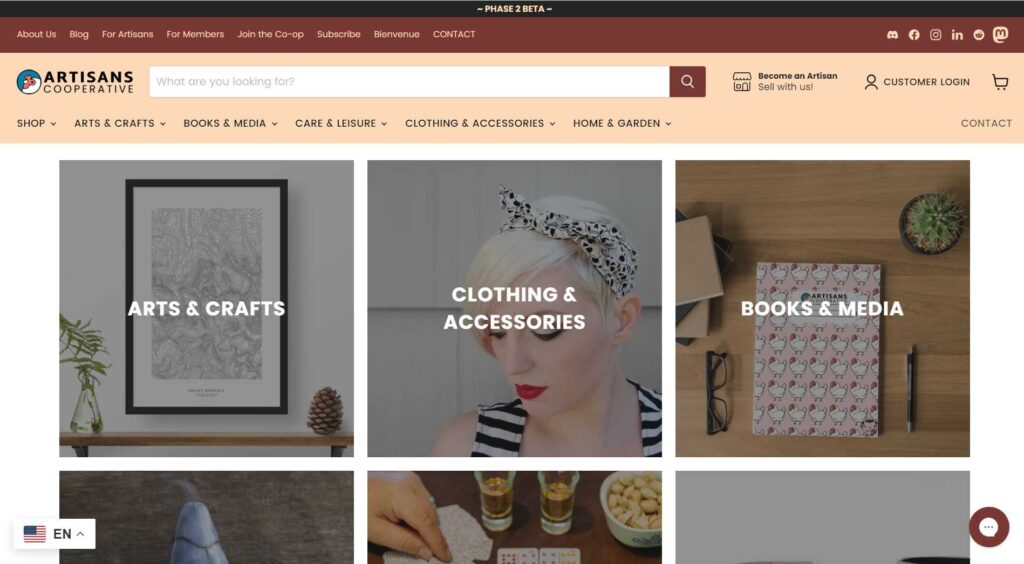
📌 Pricing:
- The cooperative requires you to pay a one-time buy-in fee to become a member-owner. But this fee is not publicly open on their website.
- The marketplace doesn’t charge listing fees
- There is a sales commission, but it’s also not specified
| Pros | Cons |
| + The member-owned cooperative model gives sellers a voice in shaping the marketplace + Address issues of mass-produced items competing unfairly with handmade goods + No listing fees | – Smaller customer base compared to established marketplaces like Etsy – A one-time buy-in fee is required – They are not upfront about costs and fees |
14. Bonanza
📌 Best for: Merchants who want a platform with lower fees and commissions compared to some competitors
And last but not least, Bonanza is among the best Etsy alternatives, as it has been around for over 15 years. Bonanza provides several features to support sellers, such as easy import options from other platforms like Amazon, eBay, Etsy, and Shopify. They also offer website options for sellers who want their own branded online presence.
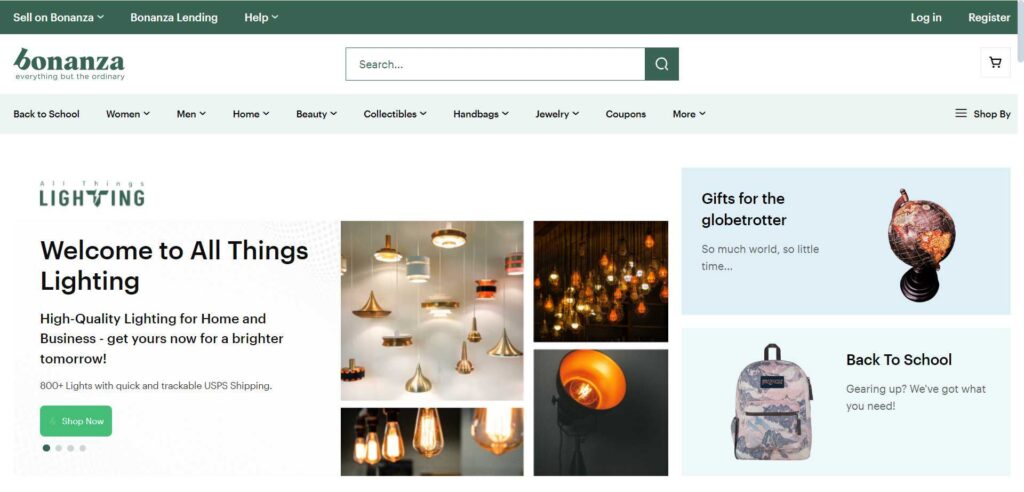
📌 Pricing:
- No listing fees
- Commission fees: 3.5% for items sold over $500 (max $250 per item), 5% for items under $500
- Optional advertising fees for increased visibility
| Pros | Cons |
| + Lower commission fees compared to some competitors + User-friendly platform for sellers to set up online “booths” quickly + Easy import products from Amazon, eBay, Etsy, and Shopify | – May require additional paid tools for advanced features like inventory management – Less visibility and traffic compared to larger marketplaces like eBay |
Wrapping up
Etsy is a splendid marketplace to get started listing and selling your art, and handmade items online. However, to have more information on whether Etsy suits you or not, it’d be wiser to open your eyes to more available options out there.
On that note, we really hope our list of the 14 Etsy alternatives can help you have more helpful insights about other eCommerce platforms and choose the one that best aligns with your interests.
FAQs
Which platform is better than Etsy?
It depends on your location, product category, and, most importantly, your needs and goals. For instance, Shopify is a solid choice if you’re looking for a powerful eCommerce platform to build a scalable e-website.
Meanwhile, marketplaces like Goimagine, or Amazon Handmade are best for their large audiences.
What is Etsy’s biggest competitor?
From our perspective, Etsy’s biggest competitor is Amazon Handmade– the largest online retailer in the United States.
Is it better to have an Etsy or a website?
From our experience, it is better to open an Etsy store first, and once you start getting decent sales, use that profit to invest in a website to build your branding.
Is Shopify or Etsy better?
It depends. Etsy has a great global audience but gives you little control over how your store looks and works. Nevertheless, everything you do, you must follow their “rules.”
Shopify gives you much more control over your store operations, data, etc., but you have to put in more effort to get your first sales and scale your store up.

